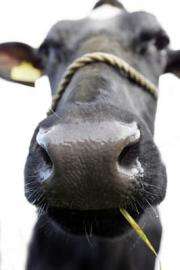Names give cows a lotta bottle

(�鶹��ԺOrg.com) -- A cow with a name produces more milk than one without, scientists at Newcastle University have found. Drs Catherine Douglas and Peter Rowlinson have shown that by giving a cow a name and treating her as an individual, farmers can increase their annual milk yield by almost 500 pints.
The study, published online today in the academic journal Anthrozoos, found that on farms where each cow was called by her name the overall milk yield was higher than on farms where the cattle were herded as a group.
“Just as people respond better to the personal touch, cows also feel happier and more relaxed if they are given a bit more one-to-one attention,” explains Dr Douglas, who works in the School of Agriculture, Food and Rural Development at Newcastle University.
"What our study shows is what many good, caring farmers have long since believed.
“By placing more importance on the individual, such as calling a cow by her name or interacting with the animal more as it grows up, we can not only improve the animal's welfare and her perception of humans, but also increase milk production."
Dairy farmer Dennis Gibb, who co-owns Eachwick Red House Farm outside Newcastle with his brother Richard, says he believes treating every cow as an individual is “vitally important”.
“They aren’t just our livelihood - they’re part of the family,” says Dennis. “We love our cows here at Eachwick and every one of them has a name. Collectively we refer to them as ‘our ladies’ but we know every one of them and each one has her own personality.”
What the study found
The Newcastle University study looked at how farmers’ attitudes to their cows influenced milk production.
Dr Douglas and Dr Rowlinson questioned 516 UK dairy farmers about how they believed humans could affect the productivity, behaviour and welfare of dairy cattle.
Almost half - 46 per cent - said the cows on their farm were called by name. Those that called their cows by name had a 258 litre higher milk yield than those who did not.
Sixty six per cent of farmers said they “knew all the cows in the herd” and 48 per cent agreed that positive human contact was more likely to produce cows with a good milking temperament.
Almost 10 per cent said that a fear of humans resulted in a poor milking temperament.
Dr Douglas added: “Our data suggests that on the whole UK dairy farmers regard their cows as intelligent beings capable of experiencing a range of emotions.
“Placing more importance on knowing the individual animals and calling them by name can - at no extra cost to the farmer - also significantly increase milk production."
Academic paper: Exploring stock managers’ perceptions of the human-animal relationship on dairy farms and an association with milk production. Catherine Douglas (nee Bertenshaw) and Peter Rowlinson
Published in: Anthrozoos, Berg Publishing. DOI: 10.2752/089279307X224764
Provided by Newcastle University




















